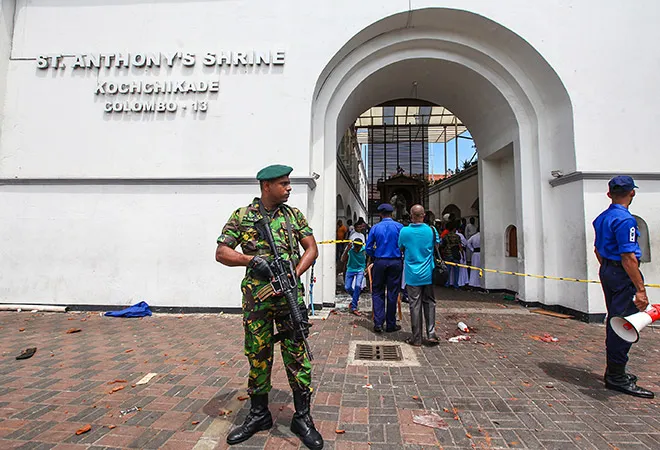The bomb blasts that shook Sri Lanka on Easter Sunday shattered a decade-long peace on the island nation, once again bringing to the fore the underlying tensions in the nation’s society and polity. The gruesome bombings were a stark reminder of the nation’s violent past, when a 25-year civil war took more than 70,000 lives and ended when Sri Lankan forces finally defeated the Tamil Tigers in 2009.
The carefully coordinated and meticulously planned attacks first targeted busy Easter services at churches in the cities of Colombo, Negombo, and Batticaloa. Then blasts spread through three luxury hotels in the capital city of Colombo: the Shangri La, Cinnamon Grand, and Kingsbury. At least 39 foreigners are among those killed in the attacks, including at least three Indians, five British citizens, two Turkish nationals, and two Chinese citizens.
Clearly Sri Lanka’s minority Christian community, accounting for less than 10 percent of the total population of 21.4 million, was the main target of Sunday’s attack. While religious tensions have grown in recent years, with the emergence of radical Islamist groups on the one hand and a surge in ultra-nationalist Buddhism led by the Bodu Bala Sena on the other, Christians had so far not been the targets of violence in Sri Lanka. But now global narratives are seemingly influencing Sri Lanka’s local conflict.
Stung by these attacks, the Sri Lankan government was forced to take a number of measures so as to project a semblance of order. The president appointed a three person panel to investigate the bombings even as additional powers have been given to the police and security forces to detain and interrogate people. The government also temporarily blocked social media, including Facebook and Instagram.
And then the Sri Lankan government finally pinged a little-known radical Islamist group, National Thowheeth Jama’ath (NTJ), for the attacks. Last year, this group was responsible for vandalizing Buddhist statues, but so far has had no history of carrying out such spectacular violent attacks. On Tuesday, it became more apparent that the group received support from a global terror network for this attack though the suicide bombers have all been declared to be Sri Lankan citizens.
Given that a well planned and well coordinated attack of this complexity could not have been expected without external support, some had pointed out early that there was a possibility of a likely Islamic State connection. There have been reports about the presence of around 100 Sri Lankan fighters in Syria and Iraq, giving some credibility to the IS imprint in these attacks.
But what is really significant about these attacks is the apparent serious intelligence failure in heeding early warnings. Ten days before the bombings, Sri Lankan security services were warned that a radical Islamist group was planning suicide attacks against churches, but there was no follow up action. These warnings were repeated a day before the attacks and India was part of this intelligence exchange. There has been a tactical failure insofar as Sri Lanka’s institutional framework has been found to be wanting at a time of such a grave crisis. But there has also been a larger strategic failure in keeping track of the evolution of NTJ from a fringe group into a larger threat, if reports of its involvement are indeed correct.
Sri Lankan Prime Minister Ranil Wickremesinghe also made it clear that neither he nor his cabinet ministers had been informed of the warning, underscoring the power struggle between him and President Maithripala Sirisena, who is also the defense minister and to whom nation’s intelligence agencies report. Tensions between Sirisena and Wickremesinghe will now be aggravated as the country moves closer to elections. The Rajapaksa clan which is waiting in the wings to succeed Sirisena will be eager to underscore his family’s credentials in tackling the Tamil insurgency at the end of the Civil War
Developments in Sri Lanka pose challenge to Indian security. If NTJ is really the source of problem, then its presence in needs to be examined carefully. And if IS has indeed played a role, then the impact of IS ideology despite the group’s decimation in Iraq and Syria, will have to be assessed. India will have to be work more closely with like minded neighboring countries like Sri Lanka and Bangladesh to evolve a pan-South Asian approach to this disturbing trend.
This commentary originally appeared in The Diplomat.
The views expressed above belong to the author(s). ORF research and analyses now available on Telegram! Click here to access our curated content — blogs, longforms and interviews.




 PREV
PREV


